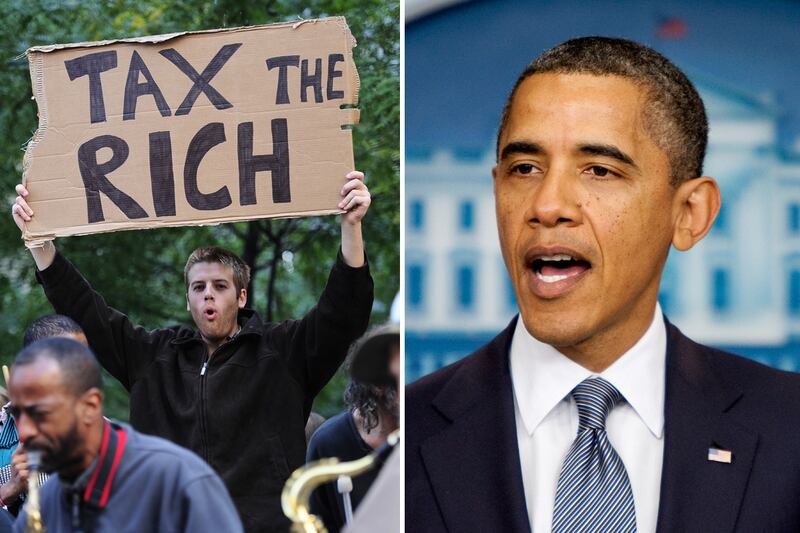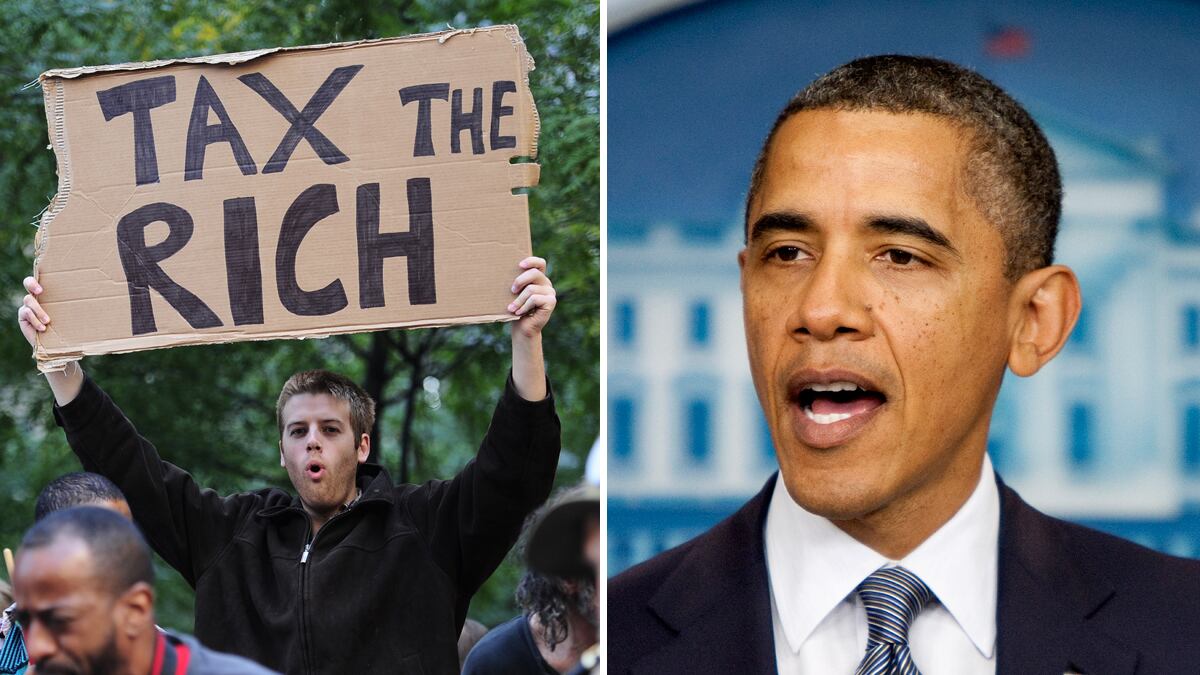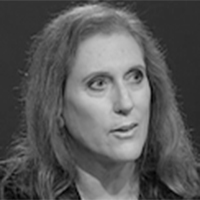President Obama and his aides are increasingly making common cause with the Occupy Wall Street protestors angry about the greed and influence of the nation’s financial powerhouses. That’s a sensible move for a chief executive searching for some populist appeal.
This is a president, after all, who helped bail out the banks, did not press to punish or prosecute the titans who created the financial crisis, hired Tim Geithner as Treasury Secretary, and spent much of his term negotiating with Republicans who habitually, in his own words, leave him at the altar.
And yet expressing sympathy with those who are demonstrating against obscene Wall Street profits is a bit tougher when your campaign is tapping that very street for loads of cash.
Close to 100 of the big-money bundlers for Obama’s reelection team have ties to investment banks and other financial institutions such as Morgan Stanley, Goldman Sachs, JP Morgan Chase, and Bank of America--each of which received tens of millions of dollars in bailout money at the start of the recession. The campaign has roughly 360 bundlers, the high-powered executives who vacuum up individual contributions of $2,500 and assemble them into larger packages.
Most of the companies--including Lime Rock Partners, a global company specializing in the energy sector, and Riverside Partners, a Boston-based private equity firm focused on health care--are smaller and don’t garner big headlines like Goldman Sachs. But overall, the Wall Street-linked bundlers have brought in between $15.3 million and at least $27.7 million for the president.
Former New Jersey governor and Goldman Sachs chief executive Jon Corzine, who now works at MF Global Holdings, raised at least $500,000 for Obama. Other heavy hitters include Bruce Heyman, a managing director for Goldman Sachs, who with his wife raised between $200,000 and $500,000. Robert Wolf, president of UBS Investment Bank, raised at least a half million dollars.

The campaign isn’t putting out press releases about its well-connected bundlers, especially those who hail from the less-than-popular world of high finance. Those details are buried in federal election records. For public consumption, Obama would much rather identify with those who are venting their frustration at Wall Street—and winning a measure of public approval in the process.
Obama campaign spokesman Ben LaBolt says Obama is raising money from people who share his goals, including some in the financial sector. “There are business leaders across industries who agree with the president” about the need to prevent “risky Wall Street deals that threaten our entire economy” and the need for an economy based on education and innovation, not loopholes and outsourcing, he said.
To be sure, Obama often expresses concern about unemployment, income inequality, and the need for balance and fairness in coping with debt and recession.
Occupy Wall Street’s chief value to Obama is that it gives him a powerful and timely framework for what he would be doing and saying anyway: trying to pass his American Jobs Act or at least pieces of it, touting his new Consumer Financial Protection Bureau, and warning of GOP plans to repeal not just health care reform but the new financial reform law aimed at keeping Wall Street from crashing the economy again.
The movement defines itself as “fighting back against the corrosive power of major banks and multinational corporations over the democratic process, and the role of Wall Street in creating an economic collapse that has caused the greatest recession in generations.” Obama is putting more emphasis on the latter, but he also regularly bashes lobbyists and special interests. He often says he understands the frustrations behind Occupy Wall Street. One of his spokesmen, Josh Earnest, even used the signature movement phrase “the 99 percent” the other day, a reference to the non-wealthy.
The shift in tone from Obama the consensus-builder is rather stark. One doctor has diagnosed the president with “obsessive bipartisan disorder.” Even Obama cops to a bit of that. “I’ve tried so hard to cooperate with Republicans, Democrats have been getting mad at me,” he said on his trip to North Carolina.
So far, Obama is staying in what Democratic strategist Geoff Garin calls “his own parallel lane” that does not “overly intersect with the protest movement itself.” That makes political sense, given the uncertainties surrounding the direction of Occupy Wall Street and also the nature of this particular protest. The idea of occupation is vivid and evocative, but it’s also impractical. Who can devote day after day, week after week, to camping out in downtown Manhattan or any other “occupied” patch of territory in America? Certainly not most of the 99 percent, who are juggling kids and jobs and all the other life demands made so much more difficult by recession and flat or falling wages.
Who is showing up? Onetime Bill Clinton pollster Doug Schoen reports that based on discussions with 200 protestors in New York, they are “dangerously out of touch” and “bound by a deep commitment to radical left-wing policies.” Will Marshall, president of the centrist Progressive Policy Institute, calls them “wingnuts” who must be shoved “back to the margins where they belong” while progressives “seize the center.” The moderate group Third Way offered up a phalanx of experts to argue that “Democrats have it wrong on this one.”
But what about the political point, that Obama and the Democrats will turn off moderates and independents if they get too close to Occupy Wall Street? A study sponsored by Third Way this year found that moderates are more skeptical than liberals about government and less likely to believe it’s up to the government to shrink the income gap. Based on reams of polling data, the study also found that nearly half the country calls itself “moderate” and no Democrat has won the presidency since 1980 without winning at least 60 percent of the moderate vote. The group concludes it would be more effective to link Republicans with the Tea Party, which is very unpopular with moderates.
In fact, a series of recent polls show that fewer than three in ten people have a favorable view of the tea party. An alignment with Occupy Wall Street, by contrast, looks like an attractive bet for now. New polls from Time, Reuters, and NBC News-Wall Street Journal suggest Americans see the movement in a positive light.
Another new poll, from National Journal, finds that 68 percent of Americans support the 5 percent tax surcharge on millionaires that Democrats and Obama have proposed to pay for their jobs bill. An even higher proportion of independents, 71 percent, were in favor of it. Another interesting factoid comes from Occupy Wall Street, which says 70 percent of visitors to its website are politically independent.
Most independents have turned away from Obama since 2008. Elaine Kamarck, a Democratic strategist and Kennedy School professor who co-authored the Third Way study, says it will be hard for Obama to win them back, but “there’s no evidence that they’re different economically than anybody else. So they would respond to a strong economic message.” Same goes for moderates. “You can’t go wrong in this economy if you’ve got some sensible, easy to understand protections for the middle class,” she says.
Republicans are providing frequent grist to make Obama’s job easier. In last week’s debate, Herman Cain stood by his statement that “If you don’t have a job, and you’re not rich, blame yourself”—not Wall Street or big banks. And Mitt Romney recently told the Las Vegas Review Journal, serving the foreclosure capital of America, that to help housing, “don’t try and stop the foreclosure process. Let it run its course and hit the bottom, allow investors to buy the homes, put renters in, fix the homes up and let it turn around and come back up.” Obama strategist David Axelrod boiled that down to a 5-second sound bite on the CBS Early Show: “Mitt Romney thinks we need more and faster foreclosures.”
Romney has also had greater success than Obama with the Wall Street money guys. The Center for Responsive Politics found that the former Massachusetts governor has raised nearly twice as much as the president from what it calls the FIRE sector – finance, insurance and real estate. And as the New York Times has noted, Goldman Sachs employees gave Obama more than $1 million in the 2008 campaign, but the score so far this time is Romney $350,000, Obama $45,000.
That’s hardly surprising, considering that Obama has been accusing Republicans of wanting to let the financial world return to “the good old days before the financial crisis, when Wall Street was writing its own rules.” But such rhetoric hasn’t stopped the president from turning to Wall Street bundlers to finance his reelection machine.







